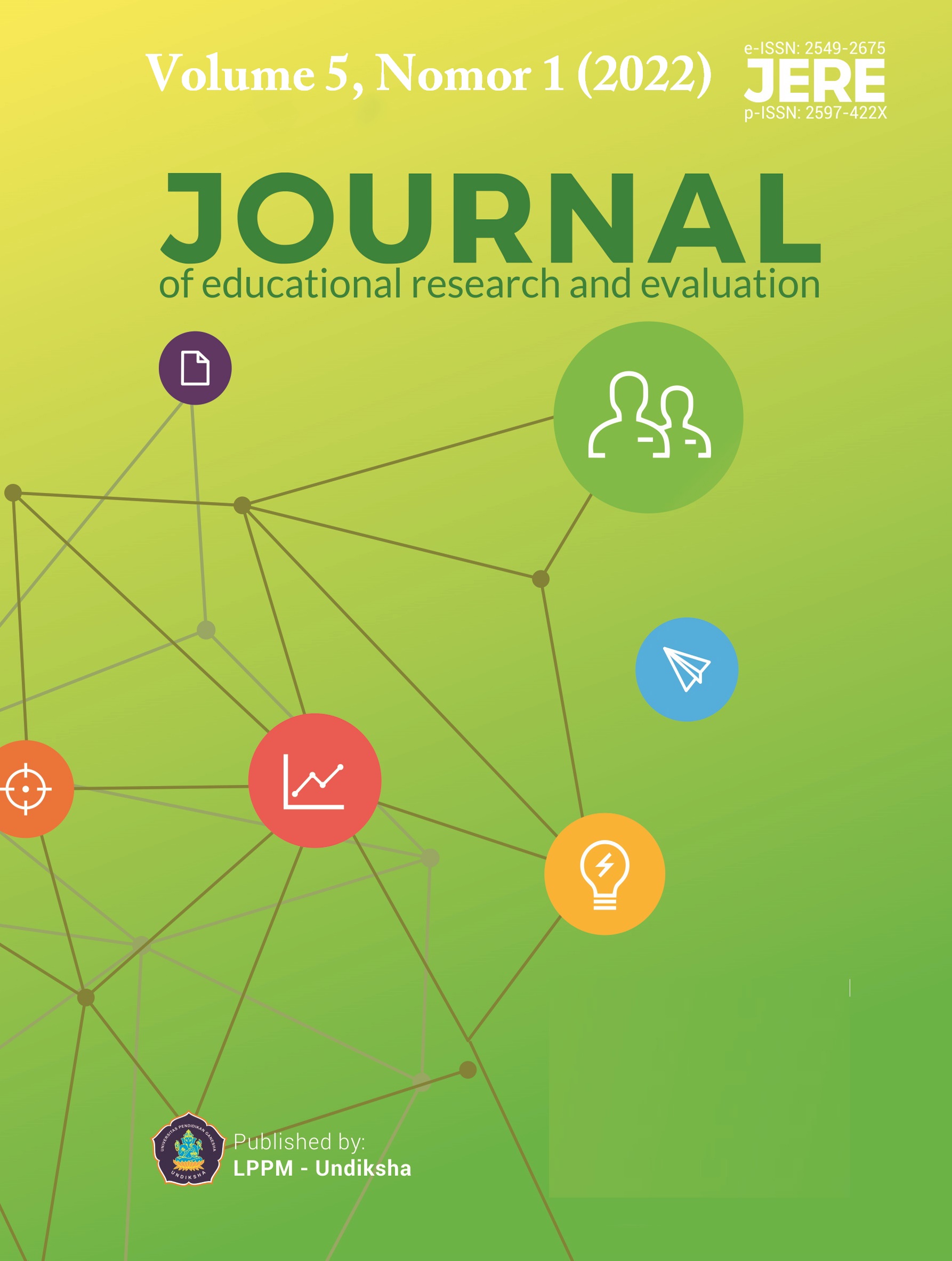Contribution of the Facilities Completeness and Learning Interests on Student Practical Capabilities in Broad-Based Network Technology Subject
DOI:
https://doi.org/10.23887/jere.v5i1.30333Keywords:
Practical Facilities, Learning Interest, Practice CapabilityAbstract
Based on the preliminary observations that have been done, it was found that the students' practice skills were still low in the area-based network technology subject. Based on the agreed value standard, the minimum score in productive subjects is 80, so the results of the students' practical capability show that it has not been fully achieved. This research is qualitative research with a correlational approach, which aims to reveal how much the practical facilities completeness and students' interest in learning to practical skills in the area-based network technology subject. The population of this study was students of class XI, which consisted of 34 students. At the same time, the sample was taken from a population of 25 students. The data was collected using a questionnaire, and the value of practice and the data were analyzed using correlation and regression techniques. Based on the data analysis, it was found that: completeness of practical facilities contributed 28% to practical skills, learning interest contributed 34.2% to practical capabilities, completeness of practical facilities and interest in learning together contributed 82.3% to the ability practice.
References
Baiti, A. A., & Munadi, S. (2014). Pengaruh Pengalaman Praktik, Prestasi Belajar Dasar Kejuruan dan Dukungan Orang Tua Terhadap Kesiapan Kerja Siswa SMK. Jurnal Pendidikan Vokasi, 4(2). https://doi.org/10.21831/jpv.v4i2.2543
Cahyono, D., Pratama, A., & Rani, H. A. D. (2020). Pengembangan Video Pembelajaran untuk Meningkatkan Hasil Belajar Peserta Didik di Smk Negeri 1 Kempas Kelas XI pada Mata Pelajaran Teknologi Jaringan Berbasis Luas (WAN). Joined Journal (Journal of Informatics Education), 3(1), 52-61. https://doi.org/10.31331/joined.v3i1.1075
Fimansyah, D. (2015). Pengaruh Strategi Pembelajaran dan Minat Belajar Terhadap Hasil Belajar Matematika. Judika (Jurnal Pendidikan UNSIKA), 3(1). https://journal.unsika.ac.id/index.php/judika/article/view/199
Iriani, D. S., & Soeharto, S. (2015). Evaluasi Pelaksanaan Praktik Kerja Industri Siswa Kompetensi Keahlian Jasa Boga SMK N 3 Purworejo. Jurnal Pendidikan Teknologi dan Kejuruan, 22(3), 274-290. https://doi.org/10.21831/jptk.v22i3.6835
Kartika, S., Husni, H., & Millah, S. (2019). Pengaruh Kualitas Sarana dan Prasarana Terhadap Minat Belajar Siswa dalam Pembelajaran Pendidikan Agama Islam. Jurnal Penelitian Pendidikan Islam,[SL], 7(1), 113-126. https://riset-iaid.net/index.php/jppi/article/view/360
Lafianto, P. (2013). Motivasi Dan Persepsi Siswa Tentang Kelengkapan Fasilitas Praktik Serta Pengaruhnya Terhadap Prestasi Belajar Siswa Kelas X SMK N 2. Jurusan Pendidikan Teknik Elektro, 2(1), 26-33. https://eprints.uny.ac.id/32378/1/Putaris%20Lafianto%20-%2007501241021.pdf
Nugroho, B. Y., & Samidjo, S. (2013). Pengaruh Kelengkapan Fasilitas Praktik dan Kedisiplinan Siswa Terhadap Hasil Evaluasi Belajar Akhir Semester Mata Pelajaran Kerja Bangku Siswa Kelas I Jurusan Teknik Permesinan SMK Pembangunan Kutowinangun Kebumen Tahun Ajaran 2012/2013. Jurnal Taman Vokasi, 1(2). http://dx.doi.org/10.30738/jtv.v1i2.97
Nurhasanah, S., & Sobandi, A. (2016). Minat belajar sebagai determinan hasil belajar siswa. Jurnal Pendidikan Manajemen Perkantoran (JPManper), 1(1), 128-135. https://doi.org/10.17509/jpm.v1i1.3264
Pratiwi, N. K. (2017). Pengaruh Tingkat Pendidikan, Perhatian Orang Tua, dan Minat Belajar Siswa Terhadap Prestasi Belajar Bahasa Indonesia Siswa SMK Kesehatan di Kota Tangerang. Pujangga, 1(2), 31. http://dx.doi.org/10.47313/pujangga.v1i2.320
Putra, A. I., & Widodo, R. D. (2009). Pengaruh Pengalaman Praktik Kerja Industri Terhadap Minat Berwirausaha Pada Siswa Kelas XII Program Keahlian Teknik Mekanik Otomotif SMK Texmaco Pemalang. Jurnal Pendidikan Teknik Mesin, 9(1). http://ejournal.unp.ac.id/index.php/mpe/article/view/4240
Riwahyudin, A. (2015). Pengaruh Sikap Siswa dan Minat Belajar Siswa Terhadap Hasil Belajar IPA Siswa Kelas V Sekolah Dasar di Kabupaten Lamandau. Jurnal Pendidikan Dasar, 6(1), 11-23. http://journal.unj.ac.id/unj/index.php/jpd/article/view/427
Santi, M. E. (2014). Pengaruh Pengalaman Praktik Kerja Industri, Kompetensi Keahlian, dan Intensitas Pendidikan Kewirausahaan dalam Keluarga Terhadap Kesiapan Berwirausaha. Jurnal Pendidikan Humaniora, 1(2), 127-135. http://journal.um.ac.id/index.php/jph/article/view/4046
Saputra, N., & Azhar, N. (2019). Kontribusi Konsep Diri dan Pemanfaatan Fasilitas Praktikum Terhadap Hasil Belajar Dasar Listrik Elektronika. VoteTEKNIKA: Jurnal Vocational Teknik Elektronika dan Informatika, 7(2), 105-110. http://ejournal.unp.ac.id/index.php/voteknika/article/view/104345
Setiawati, L., & Sudira, P. (2015). Faktor-Faktor Yang Mempengaruhi Prestasi Belajar Praktik Kejuruan Siswa SMK Program Studi Keahlian Teknik Komputer dan Informatika. Jurnal Pendidikan Vokasi, 5(3), 325-339. https://doi.org/10.21831/jpv.v5i3.6487
Siagian, R. E. F. (2015). Pengaruh Minat Dan Kebiasaan Belajar Siswa Terhadap Prestasi Belajar Matematika. Formatif: Jurnal Ilmiah Pendidikan MIPA, 2(2). http://dx.doi.org/10.30998/formatif.v2i2.93
Yulianti, I., & Khafid, M. (2015). Pengaruh Pengalaman Praktik Kerja Industri, Motivasi Memasuki Dunia Kerja, dan Kemampuan Soft Skills Terhadap Tingkat Kesiapan Kerja Siswa Kelas XII Kompetensi Keahlian Akuntansi di SMK Negeri 2 Semarang Tahun Ajaran 2014/2015. Economic Education Analysis Journal, 4(2). https://journal.unnes.ac.id/sju/index.php/eeaj/article/view/6771
Downloads
Published
How to Cite
Issue
Section
License
Authors who publish with the Journal of Evaluation and Research in Education (JERE) agree to the following terms:
- Authors retain copyright and grant the journal the right of first publication with the work simultaneously licensed under a Creative Commons Attribution License (CC BY-SA 4.0) that allows others to share the work with an acknowledgment of the work's authorship and initial publication in this journal.
- Authors are able to enter into separate, additional contractual arrangements for the non-exclusive distribution of the journal's published version of the work (e.g., post it to an institutional repository or publish it in a book), with an acknowledgment of its initial publication in this journal.
- Authors are permitted and encouraged to post their work online (e.g., in institutional repositories or on their website) prior to and during the submission process, as it can lead to productive exchanges, as well as earlier and greater citation of published work. (See The Effect of Open Access)











